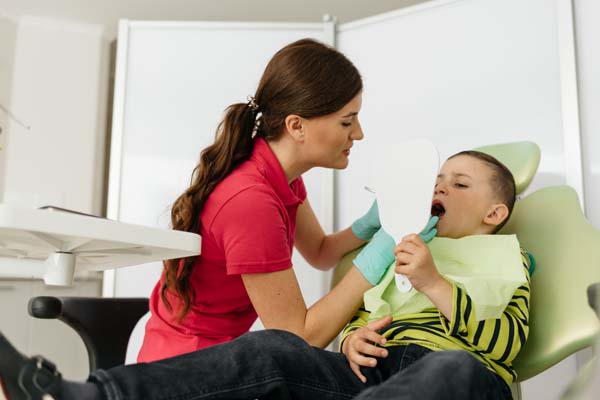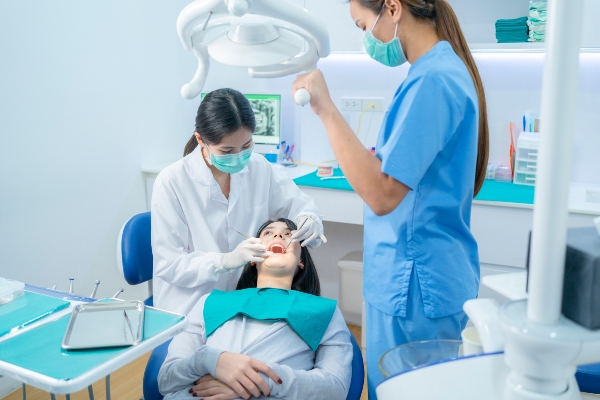When Are Kids Dental Crowns Recommended by a Pediatric Dentist?

While commonly associated with adults, dental crowns play a significant role in pediatric dentistry, so here, we explain the various aspects of kids dental crowns, including their purpose, recommendations, types, and placement process.
A pediatric dentist discusses when kids dental crowns are recommended
Kids dental crowns can help parents protect their child's oral health and development. Here is everything that parents should know about when kids dental crowns are recommended and how they are beneficial for a child's oral health.
What are kids dental crowns?
Kids dental crowns, also known as dental caps, are protective coverings placed over primary or permanent teeth to protect them from further harm. They are designed to restore the shape, size, and strength of a tooth that might have been damaged by tooth decay or dental trauma. For children in particular, dental crowns serve a unique purpose because they address dental issues that can impact their overall oral health and development.
When are kids dental crowns professionally recommended?
Pediatric dentists recommend kids dental crowns if the child has severely decayed or damaged teeth. Minor cavities are often treated with dental fillings, but moderate to severe cavities typically require something stronger to help ensure that the child does not experience discomfort and to protect the tooth for the long term. In cases of dental trauma, dental crowns are effective at restoring teeth that are chipped or cracked. Kids dental crowns may also be recommended for:
- Strengthening weak teeth
- Protecting a tooth after a baby root canal
- Helping improve the cosmetic appeal of a tooth (or multiple teeth)
What are the different types of kids dental crowns?
Each type of kids dental crown has unique advantages. Specifically, there are four primary types of dental crowns for kids. These include:
- Stainless-steel crowns: These cost-effective options reliably protect molars and premolars in children.
- Composite crowns: These tooth-colored crowns provide cosmetic appeal. They are primarily recommended for highly visible front teeth that do not need the same level of strength as molars.
- All-porcelain crowns: These tooth-colored options provide optimal aesthetic appeal, though they may cost more than alternative options and are best suited for permanent teeth.
- Porcelain-fused-to-metal crowns: These combine the strength of metal with the cosmetic benefits of porcelain to provide a nice balance between the two.
How long do kids dental crowns last?
The longevity of a kids dental crown depends on various factors, including the type of crown and the child's oral hygiene practices. For example, metal alloy crowns tend to last longer than tooth-colored crowns (i.e., porcelain crowns). Children should also be careful to avoid dental trauma because it could damage the crown and lead to the need for replacement.
On average, dental crowns for children can last anywhere from five to 10 years. In some cases, they last for 15 years or more. Regular dental check-ups and proper oral hygiene significantly contribute to the lifespan of a kids dental crown.
What are the risks without a kids dental crown?
A kids dental crown from a pediatric dentist is essential to avoid unnecessary discomfort and severe oral health concerns. Dental cavities, chips, and cracks expose the underlying layers of teeth. Consequently, children who do not receive the proper treatment may experience pain and discomfort that affects their ability to eat, speak, and focus throughout the day.
Simply extracting the tooth is not always an option either. Baby teeth that are removed earlier than necessary may contribute to orthodontic concerns. Additionally, tooth decay may worsen and lead to tooth infections that can spread to other areas of the mouth and body.
What are the alternatives to a kids dental crown?
Alternatives are examined on a case-by-case basis. In some situations, there are no viable alternatives to a dental crown for children. In other instances, several may be preferable. The most notable possible alternatives to kids dental crowns are:
- Dental filling
- Root canal or pulpotomy (though a crown may still be necessary after the procedure)
- Tooth extraction (if the tooth cannot be saved with a crown or if it is a primary tooth that is likely to fall out soon)
Schedule a visit with our pediatric dentist today
If your child has oral health concerns that may require a kids dental crown, we would love to hear from you. We provide pediatric dental services (including pediatric crowns), along with preventive and diagnostic services. Contact us today to schedule a time for you and your child to visit us.
Request an appointment here: https://www.hvkidsmiles.com or call Hudson Valley Pediatric Dentistry at (845) 363-4177 for an appointment in our Middletown office.
Check out what others are saying about our dental services on Yelp: Dental Crowns and Dental Bridges in Middletown, NY.
Recent Posts
Kids dental crowns are restorations used to prevent baby teeth from falling out before they are supposed to. Baby teeth hold space for permanent teeth, ensuring proper dental development and jaw alignment. While some parents may wonder why a pediatric dentist would not simply pull damaged teeth, kids' dental crowns protect affected baby teeth from…
Pediatric dentistry is a field that deals specifically with the care of infants, children’s, and teenagers' teeth. More often than not, children experience a need for stainless-steel dental crowns. These crowns are most commonly used in pediatric dentistry due to their durability. When a child has badly decayed teeth, they should be seen by a…
The idea of a baby dental crown may spark fear in parents. However, rest assured that the procedure is straightforward and efficient. Modern-day dentistry has evolved quite a bit, and the dental specialist or pediatric dentist that performs this procedure undergoes extensive training to ensure perfection during and after the procedure is complete.When parents are…
If your dentist has recommended a baby dental crown for your child, you probably have questions about the procedure. A dental crown helps protect your child’s primary tooth from further damage and is often suggested when a tooth cannot be repaired with a dental filling. Here are frequently asked questions about baby dental crowns.A dental…


